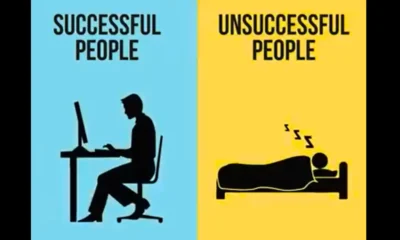Career
A Cover Letter is NOT Optional! Here Are Some Valid Reasons
What’s the value of writing a cover letter? Why do you need that if you are going to submit your resume? Does that not tell the entire story? NO WAY. Simply sending a resume is not enough. A cover letter is important. No cover letter with your resume is like leaving your house with a shirt and no pants. You wouldn’t do that, would you?
If you’re currently in the process of applying for jobs, you’ve probably come across the debate on whether or not a cover letter is necessary. Some people argue that a well-crafted resume is enough to showcase your qualifications, while others believe that a cover letter is a crucial component of a job application.
A good cover letter can prove in a few sentences that:
1. You understand the company’s opportunities and challenges
2. You are directly tied to the solution they need
3. You’ve experienced their situation before
4. You’ve delivered the kind of value they are looking for before
5. You are the right fit for the company.
A cover letter is a crucial part of any job application as it provides a platform to include every necessary detail that might not be covered in a resume. It allows you to personalize your application, showcase your personality, and explain why you are the perfect fit for the position.
A well-written cover letter highlights your key achievements, skills, and experiences that make you stand out from other candidates. It also demonstrates your interest in the company and the specific role you are applying for. Employers often use cover letters to gauge your communication skills, professionalism, and attention to detail.
Just a few sentences and bullet points to pique their interest and deliver your value message. That’s the value of a cover letter. Resumes today get about 10 seconds to impress. If your cover letter piques interest before the hiring manager turns to your resume, you just might earn some more of his or her valuable time. Therefore, taking the time to craft a strong cover letter can greatly increase your chances of securing an interview and landing the job.
| Also Read: How AI Can Help You Land Your Dream Job? |
| Also Read: 13 Best Jobs That Artificial Intelligence Can’t Replace |
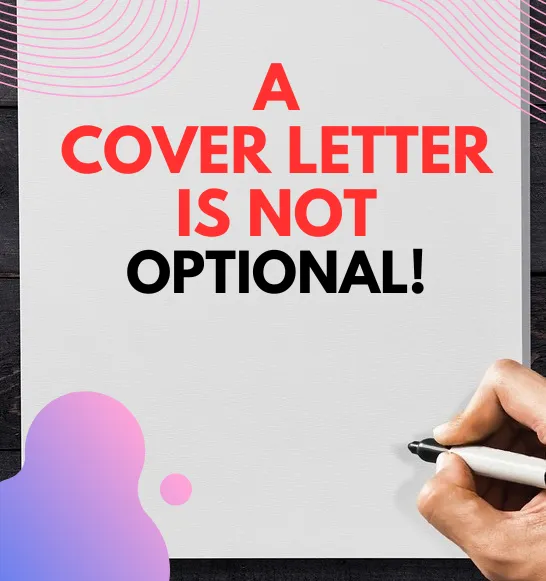
Your cover letter is part of the resume package. The ‘package’ is not complete without the cover. Will everyone read the cover? Probably not. While I haven’t done a full study of how many HR consultants read them vs. those that don’t, I can tell you this: when I worked in human resources, I ALWAYS read them. I gained a better understanding of the candidate, what underlying skills he possessed and how he might contribute to the organization I represented.
Here are some valid reasons why a cover letter is a very important complement to your resume:
Your introduction:
Your cover letter serves as your introduction. You don’t expect to walk into someone’s house through their kitchen, right? The cover is your entranceway. Here, you can enter with grace, set the tone of what the reader should expect to see on the resume.
Add value to your role:
Your cover letter demonstrates your ability to put together a cogent sentence, or in this case many sentences about what you offer in a new position and how you can add value for a potential employer.
Showcasing your communication skills:
Another important reason to include a cover letter with your job application is to demonstrate your communication skills. A well-written cover letter shows that you can articulate your thoughts clearly and concisely, which is a valuable skill in any workplace. Additionally, it allows you to showcase your writing style and attention to detail, which can give the hiring manager insight into how you would communicate with colleagues and clients if hired.
Highlight your skills and experiences:
A cover letter is also a great opportunity to explain why you are a good fit for the role and the company. You can use the cover letter to expand on specific experiences or accomplishments that are relevant to the job, and to explain how your skills and work experience make you the ideal candidate. Your cover letter is an opportunity for you to highlight certain things that you might not have been able to include in the resume. For example, perhaps you have been designing model houses since childhood, but have worked in another industry and now want to enter architecture. A cover letter would be the optimal place to discuss such information and provide specific examples of what you have designed.
Addressing potential red flags:
If there are any potential red flags in your resume, such as employment gaps or a career change, a cover letter can provide context and explanations. This allows you to proactively address any concerns the hiring manager may have and to position yourself in the best possible light. By addressing these issues head-on in your cover letter, you can reassure the employer that you are the right candidate for the job despite any perceived shortcomings.
| Also Read: How to Prepare for Remote Interviews? |
| Also Read: Why More Than 80% of CVs Are Only Fit for the Dustbin? |
Standing out in a competitive job market:
A well-crafted cover letter with your application can help you differentiate yourself from other candidates and make a strong impression on the hiring manager. A compelling cover letter that showcases your personality, passion, and qualifications can give you a competitive edge and increase your chances of getting noticed by potential employers.
Keep your letter short and to the point:
Keeping your cover letter short ensures that you deliver impactful and relevant information efficiently, capturing the attention of busy hiring managers while respecting their time. Don’t drift off topic or try to explain things away. Just show that you understand the challenges and can deliver immediate value.
Here’s a good tip:
If you want to increase the chances that your cover letter will be read by a potential hiring manager, include it in the body of your email and attach the resume. By doing this, the hiring manager will only have to open one attachment and can quickly read the cover letter when opening your email.
So, the next time you’re applying for a job, be sure to include a cover letter to make a lasting impression on employers and boost your chances of securing your dream job! Here’s to your career success!
Career
What NOT to do in a Job Interview as a Candidate?

Hey there! So, you’ve landed a job interview – that’s awesome! But wait, before you go in for that interview, there are some things you should definitely NOT do. Trust me, I’ve been through my fair share of interviews and have learned some valuable lessons along the way. Let me share with you what NOT to do in a job interview.
The thought of crumbling in a job interview is daunting for anyone. Everyone has to do it at some point, but understanding the right interview etiquette can sometimes be hard to grasp. Advice based articles on what to remember to do in an interview are always bombarding the web, but job hopefuls need to be aware of what NOT to do. Leading graduate recruitment consultancy, Graduate Recruitment Bureau gives top tips on what to avoid ensuring a smooth and successful job interview:
[10 Things You Should NOT Do at an Interview]
1. Arriving overly late or early:
first and foremost, being late looks careless and unprofessional; one of the biggest mistakes you can make in a job interview is showing up late and being too early looks overly keen and a bit desperate. Arrive around 15 minutes early to read over notes you should have on the company and be prepared. Make sure you plan your route in advance, leave early, and account for any unexpected delays. You may not be in the interview room yet, but your first impression is definitely crucial.
2. Inappropriate presentation:
Nose rings, visible tattoos, scruffy hair, and informal clothes – none of these would go down too well in the interview room. Ensure to dress smart as it is a mark of respect for the interviewer and will show you are serious about the job role. Depending on the type of position, the expected form of dress may differ. For example, wearing a suit may be required if applying for a managerial role, whereas a more smart-casual look is accepted for positions with less responsibility. Remember, you only have one chance to make a first impression. Dress professionally and make sure your outfit is appropriate for the company culture. Whether its face-to-face or remote interview it’s always better to be overdressed than underdressed.
3. Lack of Preparation:
One of the worst things you can do in a job interview is not preparing beforehand. Make sure you research the company, practice common interview questions, and have a good understanding of the role you’re applying for. This shows that you’re serious about the opportunity.
Also Read : Most Common Competency Based Interview Questions and Answers
Also Read : How to Improve Your Communication Skills with ChatGPT?
4. Interrupting the interviewer:
Even if you think you have the most amazing answer to the interviewer’s question or you think you know what they are leading up to ask, stop and WAIT. Sit tight and wait until they have finished. You may misinterpret what they are saying and go off on a tangent which won’t come across well.
5. Badmouthing Previous Employers:
One big red flag in a job interview is badmouthing your previous employers even if your new employers are their competitors, you shouldn’t a bad word about them. This shows a lack of professionalism and can make the interviewer question your attitude and loyalty. Always speak positively about your previous experiences and focus on what you learned from them.
6. Being Dishonest:
And the most important thing is never lie or exaggerate your qualifications in a job interview. Being dishonest can come back to haunt you and can damage your credibility. Be honest about your skills and experiences and focus on how you can add value to the company. It is important to be genuine and truthful during interviews to build a foundation of trust and transparency with potential employers.
7. Keeping your phone on or answering your phone:
Simple but easily forgotten. Turn your phone off. And if it does not go off, do NOT answer it. Keep it in your bag, and do not even be tempted to look at it. Wait until you have left the interview – your texts and Facebook notifications can wait but the job opportunity can’t! So, using your phone during a job interview is a big no-no. It’s incredibly rude and disrespectful to the interviewer. Make sure you turn off your phone or put it on silent before the interview starts. Your full attention should be on the interview and nothing else.
8. Lack of Enthusiasm:
Another mistake to avoid is showing a lack of enthusiasm. Employers want to hire someone who is passionate about the role and excited to join their team. Enthusiasm can make you stand out as a candidate who is motivated, energetic, and eager to contribute. It can also create a positive impression on the interviewer, showcasing your excitement about the opportunity and your willingness to go above and beyond in the role. Make sure you demonstrate your enthusiasm through your body language, tone of voice, and overall attitude.
Also Read : Most Common Competency Based Interview Questions and Answers
Also Read : How to Improve Your Communication Skills with ChatGPT?
9. Talking Too Much:
While it’s important to showcase your skills and experiences in a job interview, talking too much can be a turn-off. Firstly, it can come across as though you are not listening or respecting the interviewer’s time, leading to a lack of effective communication. Additionally, talking excessively can make you appear nervous, unprepared, and potentially undermining your credibility as a candidate. Make sure you listen to the interviewer, answer questions concisely, and allow for natural pauses in the conversation. Remember, it’s a two-way dialogue.
10. Asking about holiday time or sick days:
Remember, you haven’t got the job yet so avoid asking holiday or salary questions. This sort of information would be discussed at the negotiation phase so do not bring this up unless the interviewer does. Our very own recruitment team experienced a candidate who enquired on the company’s disciplinary policies – and followed up with a question on how many written warnings are given out before dismissal – A perfect example of what NOT to do!
Author Note:
So, there you have it, hope these tips are helps you, my friends! Good luck and do share this article with your friends and family who are preparing for the interview!
Career
10 Key Factors for Workplace Success
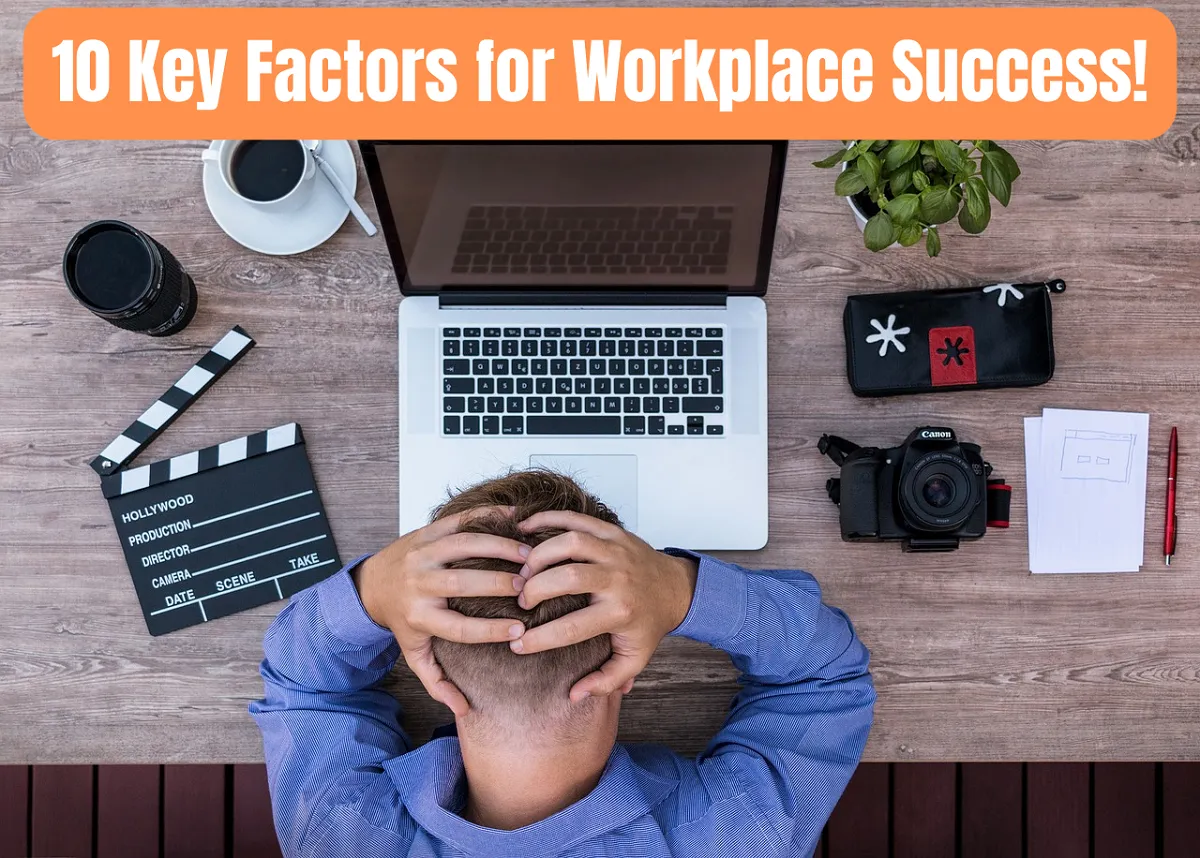
With more and more generations surpassing the qualifications benchmark set by their predecessors and the jobs market getting smaller and smaller, the competition for top end jobs has never been so high. So what does one have to consider when in the workplace. Let check it out!
1. Be more enthusiastic, and dedicated:
The more effort and enthusiasm you put into an activity the more likely you are to succeed, and this is exactly the case with employment. Although we are may not be lucky enough be doing a job we love to with unemployment figures at 1.36 million (According to UK Labour Market), it’s good to be in a job. Employers will value you more see that you’re enthusiastic about your work.
2. A good work ethic goes a long way:
If you’re prepared to do the jobs that no one else wants to do or put in the time that no one else can afford to contribute, then you’re instantly highlighting yourself as a person that has aims to go far. So why not arrive early for work to make sure that you’re prepared for the day ahead or stay back for a bit to ensure that all paperwork is done.
3. Be Organized:
How you organize your time and the place you work at is vital to achieving success in the workplace. This is where the saying “a cluttered desk represents a cluttered mind” feels true. To have a completely organized workstation and schedule save the time, effort and stress. The mind does not work as well when it’s juggling hundreds of different thoughts at once, so have a place for everything and everything in its place.
4. Be informed and well aware:
Why not get to know the organization? To be able to understand its aims, hierarchical structure and involvement in schemes presents you interest in the company and shows your desire to climb that ladder. It would also be embarrassing for you if a senior employee asked, and you weren’t able to answer. So even if it’s just basic research, get to know who you’re working for.
Also Read : How to Improve Your Communication Skills with ChatGPT?
Also Read : 10 Best Remote Jobs You Can Do While on Vacation
5. Dress smartly:
Every company/organization has an image, and every workplace tends to have an unwritten dress code. A company’s image is important as it is a way for the public to identify them and advertises that brand, so naturally all of its employees must also put in the effort to uphold the company image. To be appropriately dressed is to establish yourself as part of the team.
6. Be creative:
Ultimately, employers are always looking for someone that stands out from the masses and that involves a bit of creativity. Is there a way that you can be doing a job more effectively? Or is there something you know, or a work experience you’ve had that no one else has? If so, then don’t be shy about it, feel free to try something different or bring to the table your life experiences, because at the end of the day it is much better than blending into the other faces in the room.
7. Be stress free:
Is stress stopping you from achieving your goals, well stress gets the better of all of us, and at times it gets hard to cope. Recently the LFS discovered that in 2022/23, approximately 1.8 million people are suffering from work-related ill health and 49% of them were linked to stress, depression, and anxiety. So it is important not only for you working performance but your own health to have some form of outlet such as a hobby or a sport to relieve the stress of work and life in general.
8. Be more cooperative, sociable, or team-oriented:
We can’t exactly help who our colleagues are, and we definitely can’t control whether they like us or not. However, it doesn’t hurt to try. If you can establish a good relationship with the people you work with the likelihood is that working may become a whole lot easier, especially considering that teamwork is an important aspect of employment.
9. Keep your work life and social life separate:
We’re all guilty of not finishing work in the office and taking it home to finish off. Stop! This is wrong! To succeed you need to establish boundaries between your work life and your social life so that there is a place for your mind to relax.
Hope this article helps you! Good luck and do share this article with your friends and family!
Career
Most Common Competency Based Interview Questions and Answers (PDF)
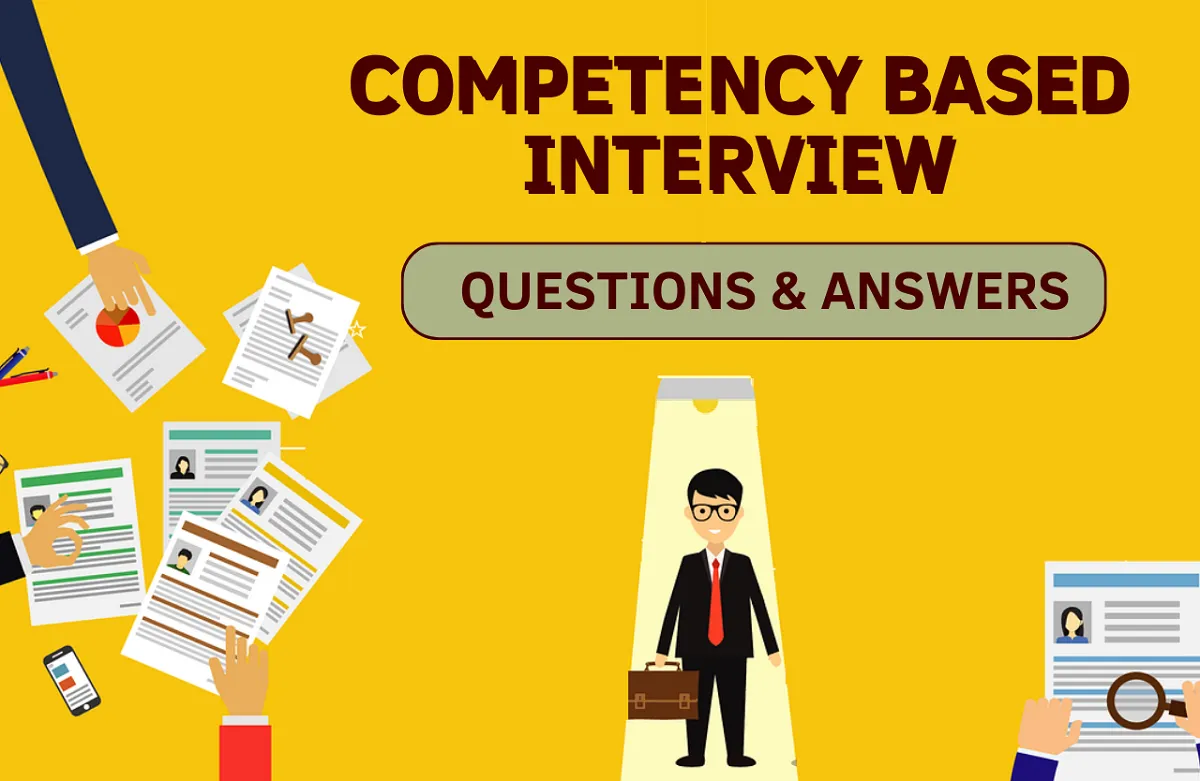
Competency based interviewing has always been a favourite tool of the selection process for many companies and more and more recruitment partners are coming to realise the benefits of selecting new employees using this technique.
The basic premise driving this type of interview is that a candidate’s past performance is the best predictor of future performance. Competency based questions are directly linked to an essential function of the position.
Interviews not based on behavioural interviewing techniques usually tend to focus exclusively on education and experience, precisely the same information that can be found on a CV. Whilst this information helps candidates get to interview stage, it has limits.
To predict how an applicant is likely to handle the job, HR consultants need to ask for examples of things the candidate has actually done that would demonstrate the key characteristics the firm needs.
Competency based interviewing also helps an organization remove bias, as a candidate is assessed on their abilities to handle different situations and not on their education and longevity of experience.
| Also Read: Why More Than 80% of CVs Are Only Fit for the Dustbin? |
| Also Read: Standard Employment Contract Template Example for UK |
Competencies are often categorised as follows:
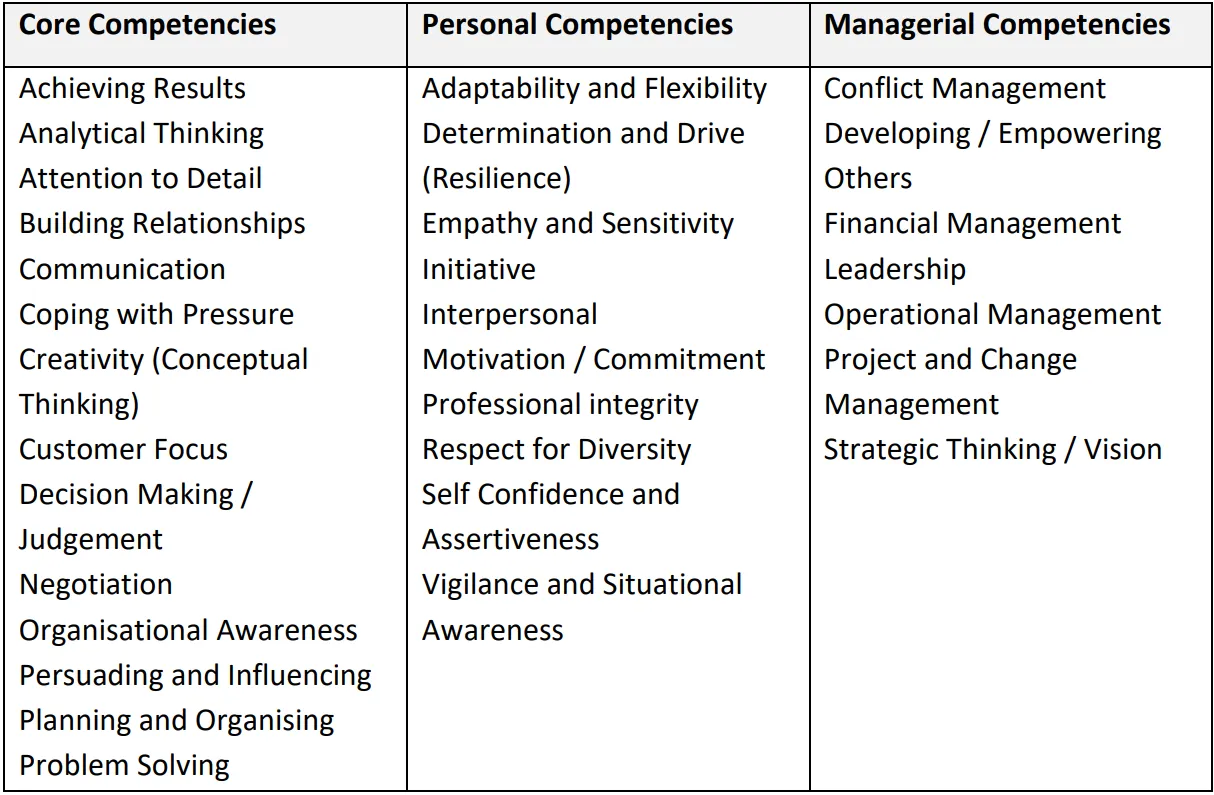
“Competency Based Interviewing removes the risk of personal bias and makes the hiring process fairer”
The Examples of Competency-based Questions Follow:
Organisational Awareness:
- Describe the structure of your company and give an example of how you work within this culture to achieve a personal / professional goal.
- Describe how you would perceive the new company and how you would adapt to this culture.
Strategic Thinking:
- Describe your most challenging audit and what you changed to adapt to that scenario.
- How did you go about assessing your own performance within this assignment?
Communication:
- How do you keep your clients informed about difficult issues that directly affect their bottom line?
- Describe a difficult where you need to use your excellent communication skills?
- Give an example of how have you helped others improve their communication skills? (particularly helpful when interviewing at managerial level).
Client Focus:
- Give an example of how you provided service to a client beyond their expectations. How did you identify this need? What was their reaction?
- Describe the process you use to stay in touch with clients’ short and long-term needs.
Client Relationship:
- Explain your approach to establishing new client relationships.
- Explain how you maintain your existing clientele despite threats from competition.
Teamwork:
- Give an example of a time when you worked in a team. How did you help the team by contributing positively?
- Give an example of a time when there was conflict within the team and how you handled it.
Leadership Ability:
- Describe how you led a team (comprising trainees, juniors and seniors) through a difficult audit. How did you improve their work?
- Describe a situation where you had to take charge either with a demanding client or with your own team.
Adaptability / Flexibility:
- Tell me about the biggest challenges you faced when starting a new job.
- Describe a situation in which you were assigned new tasks. How did you adapt to this situation? Tell me about a time you had to learn how to use a new system or software at work.
| Also Read: 5 Simple Job Hunting Tips for Fresh Graduates |
| Also Read: Best Way to Approach the Salary Question During an Interview |
Innovation:
This is especially important at the managerial level, as partners are searching for someone who can contribute to the company’s profitability:
- Describe something you have done that was new for your firm that raised the caliber of the task completed or your team’s performance.
- Have you taken any creative actions (either produced surveys or written reports) that your clients might find interesting or enhanced awareness of your firm?
Time Management:
- Give me a specific example of a time when you failed to complete an audit assignment on time.
- How did this outcome affect your firm?
- What else might you have done??
- What impact has that event had on your current approach to meeting deadlines?
How to Answer?
The ability for the candidate to connect their response to a real-world experience rather than providing a canned response from a textbook is one of the main advantages of this style of interviewing. This makes it possible for the applicant to share the details that are most pertinent to the open position.
It is ironic that while most hiring is done around technical skills, most staff retention issues arise based on softer skills such as attitude. A technical question would never reveal such a potential behavioural flaw. When competency-based behavioural interviewing forms the framework for the entire recruitment process, interviewers are able to make much more effective hiring decisions.
As more and more companies adapt to new legislation and new environments, each employee is becoming more commercially astute. No longer seen as mere employees, they are taking on the role of business consultants and ambassadors for their own firm. Competency-based behavioural interviewing enables interviewers to select the best possible candidate for their business and as such is an invaluable tool for any recruitment partner.
The structure of a competency answer is critical to its effectiveness and high score, therefore we advise adopting either the STAR or IPAR formulae as standard formulas.
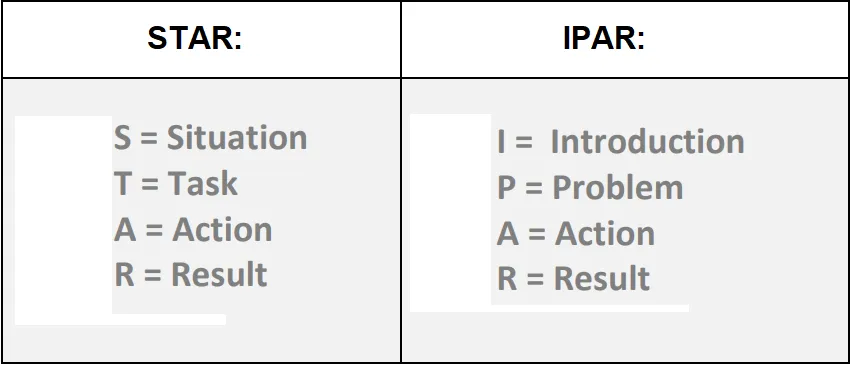
Competency Based Interview Scoring:
Different methods will be employed by organizations to score and assess, but this is an example scoring sheet from by a large UK employer.
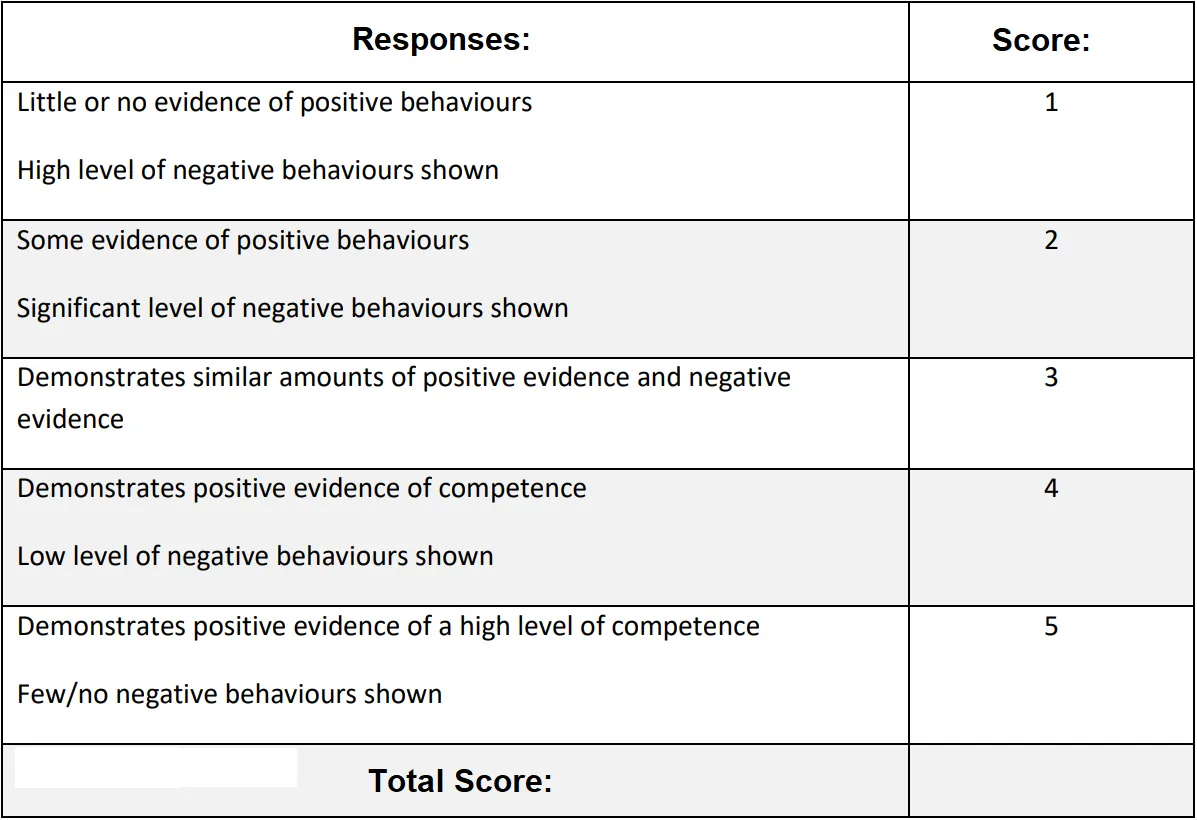
-

 Job Description4 months ago
Job Description4 months agoGraphic Designer Job Description: Education, Salary, Skills, Work Hours
-

 Career5 months ago
Career5 months agoCareer Opportunities for Seniors: 7 Jobs that are Perfect for Older Adults
-

 News5 months ago
News5 months agoStudents’ question to UK PM Rishi Sunak: “What if your kids started smoking?
-

 Career4 months ago
Career4 months ago13 Best Jobs That AI Can’t Replace: A Guide to Future-proof Careers
-

 Money4 months ago
Money4 months agoHow To Get Paid to Read Books? (9 Best & Legit Sites)
-
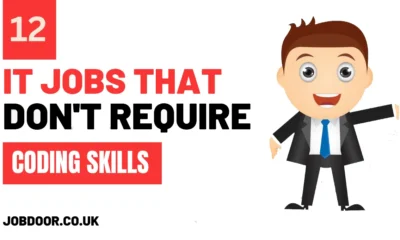
 Career4 months ago
Career4 months ago12 IT Jobs That Don’t Require Coding Skills
-

 Motivation4 months ago
Motivation4 months ago11 Things Rich People Do That The Poor Don’t
-

 Job Description4 months ago
Job Description4 months agoRestaurant Hostess Job Description: Education, Salary, Skills, Work Hours











